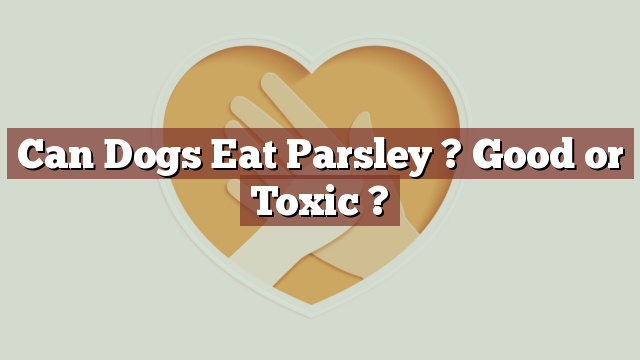Can Dogs Eat Parsley? Good or Toxic?
Knowing which foods are safe for our beloved pets is crucial for their health and well-being. Among the many foods we commonly consume, parsley is one that often raises questions regarding its safety for dogs. In this article, we will delve into the nutritional value of parsley, whether it is safe or toxic for dogs, potential risks and benefits, and what to do if your dog consumes parsley.
Nutritional Value of Parsley: Vitamins, Minerals, and More
Parsley is a leafy herb that is widely used as a culinary ingredient. Apart from its distinctive flavor, it is packed with essential nutrients that can benefit both humans and dogs alike. Parsley is a rich source of vitamins A, C, and K, as well as minerals such as calcium, iron, and potassium. Additionally, it contains antioxidants and flavonoids that contribute to its potential health benefits.
Can Dogs Eat Parsley? Learn Whether It’s Safe or Toxic
Can dogs eat parsley? Yes, they can! Parsley is generally safe for dogs to consume. In fact, many commercial dog foods and treats contain trace amounts of parsley as an added ingredient. However, it is important to note that moderation is key when feeding parsley to dogs.
While parsley is safe in small amounts, excessive consumption can lead to digestive upset and discomfort. Some dogs may be more sensitive to parsley than others, so it is important to monitor their response when introducing this herb into their diet.
Potential Risks and Benefits of Feeding Dogs Parsley
Feeding dogs parsley in moderation can have potential benefits. The natural compounds found in parsley, such as antioxidants and flavonoids, may help support the immune system and promote overall well-being. Additionally, parsley has been known to freshen breath, making it a popular ingredient in dental chews and treats for dogs.
However, it is crucial to be aware of the potential risks associated with feeding dogs parsley. Parsley contains a substance called apiol, which in large amounts, can be toxic to dogs. If consumed in excessive quantities, parsley can lead to gastrointestinal upset, including symptoms such as vomiting, diarrhea, and abdominal pain.
What to Do If Your Dog Eats Parsley: Symptoms and Treatment
If your dog consumes a small amount of parsley, monitor them closely for any signs of gastrointestinal upset. These may include vomiting, diarrhea, or a decrease in appetite. If the symptoms persist or worsen, it is recommended to consult your veterinarian for further guidance.
In cases where a dog has ingested a large amount of parsley, immediate veterinary attention may be necessary. The veterinarian may induce vomiting to prevent further absorption of toxins and administer supportive care to alleviate any discomfort or complications.
Conclusion: Moderation is Key for Dogs and Parsley
In conclusion, dogs can eat parsley in moderation. While parsley offers potential health benefits and is generally safe for dogs, it is important to be mindful of the quantity consumed. Feeding parsley as an occasional treat or adding small amounts to your dog’s food can be a flavorful and nutritious addition to their diet. However, if you have any concerns or if your dog experiences any adverse reactions after consuming parsley, it is always best to consult your veterinarian for professional advice. Remember, moderation is key when it comes to feeding our furry friends.
Thank you for investing your time in exploring [page_title] on Can-Eat.org. Our goal is to provide readers like you with thorough and reliable information about various dietary topics. Each article, including [page_title], stems from diligent research and a passion for understanding the nuances of our food choices. We believe that knowledge is a vital step towards making informed and healthy decisions. However, while "[page_title]" sheds light on its specific topic, it's crucial to remember that everyone's body reacts differently to foods and dietary changes. What might be beneficial for one person could have different effects on another. Before you consider integrating suggestions or insights from "[page_title]" into your diet, it's always wise to consult with a nutritionist or healthcare professional. Their specialized knowledge ensures that you're making choices best suited to your individual health needs. As you navigate [page_title], be mindful of potential allergies, intolerances, or unique dietary requirements you may have. No singular article can capture the vast diversity of human health, and individualized guidance is invaluable. The content provided in [page_title] serves as a general guide. It is not, by any means, a substitute for personalized medical or nutritional advice. Your health should always be the top priority, and professional guidance is the best path forward. In your journey towards a balanced and nutritious lifestyle, we hope that [page_title] serves as a helpful stepping stone. Remember, informed decisions lead to healthier outcomes. Thank you for trusting Can-Eat.org. Continue exploring, learning, and prioritizing your health. Cheers to a well-informed and healthier future!

